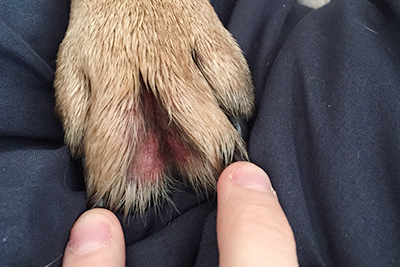
Is your dog licking at his paws constantly? Notice a red, swollen, inflamed appearance to the area between the paws? If this is happening, read on! Not only does excessive licking cause discomfort for your dog, but it is often due to an underlying medical problem. Often times, excessive licking of the paws is due to one of three underlying causes:
- Atopy (the equivalent of hay fever in people)
- Food allergies
- Flea allergy dermatitis (often abbreviated “FAD”)
Underlying itchiness is what results in that constant foot licking; the moisture caused by excessive foot licking between the paws can cause a secondary bacterial or yeast infection. This can actually worsen the itchiness and clinical signs.
Excessive licking of the paws warrants a trip to your veterinarian, as certain tests need to be performed to rule out skin problems.
How will my veterinarian figure out why my dog is licking his paws?
Diagnosis of an underlying infection requires certain tests from your veterinarian including:
- Tape preparation cytology (analysis using a piece of tape)
- Culture
- Skin biopsy (less common)
Once these tests are done, your veterinarian can determine the best course of appropriate treatment. Treatment typically includes:
- The use of anti-fungals (if there is a yeast infection)
- Antibiotics (to treat a bacterial infection)
- Frequent shampooing with a prescription shampoo
- Topical sprays
- The use of short-term steroids to decrease the inflammation
But that’s not all! Your dog may need additional testing to rule out atopy, food allergies, or flea allergy dermatitis. This may include:
- A food trial with a novel (new) protein for at least 6-12 weeks—It is absolutely key that you make sure no other rawhides, treats, snakes, bones or other food products (even heartworm medication) are given during this time. Ideally, food trials should be started in the winter (depending on the climate that you live in).
- Year-round flea and tick medication that kills quickly—Newer prescription oral products (e.g., Bravecto, Nexguard) can kill these pesky insects within 12 hours, minimizing the risk of infestation.
- Skin testing or blood testing—To see what specific airborne allergies may be causing atopy
If treatment by your veterinarian doesn’t completely resolve the signs, referral to a dermatologist may be necessary for advanced testing.
When in doubt, talk to your veterinarian about how to best treat this condition. Remember, occasional licking is ok, but if it’s constant and causing secondary redness, swelling or itchiness, get to a veterinarian for treatment.
Questions to ask your veterinarian:
- Does my dog need a prescription food trial?
- Does my dog need year-round flea and tick control?
- Does my dog have a secondary bacterial or yeast infection?
- Does my dog need a referral to a veterinary dermatologist?
If you have any questions or concerns, you should always visit or call your veterinarian -- they are your best resource to ensure the health and well-being of your pets.
